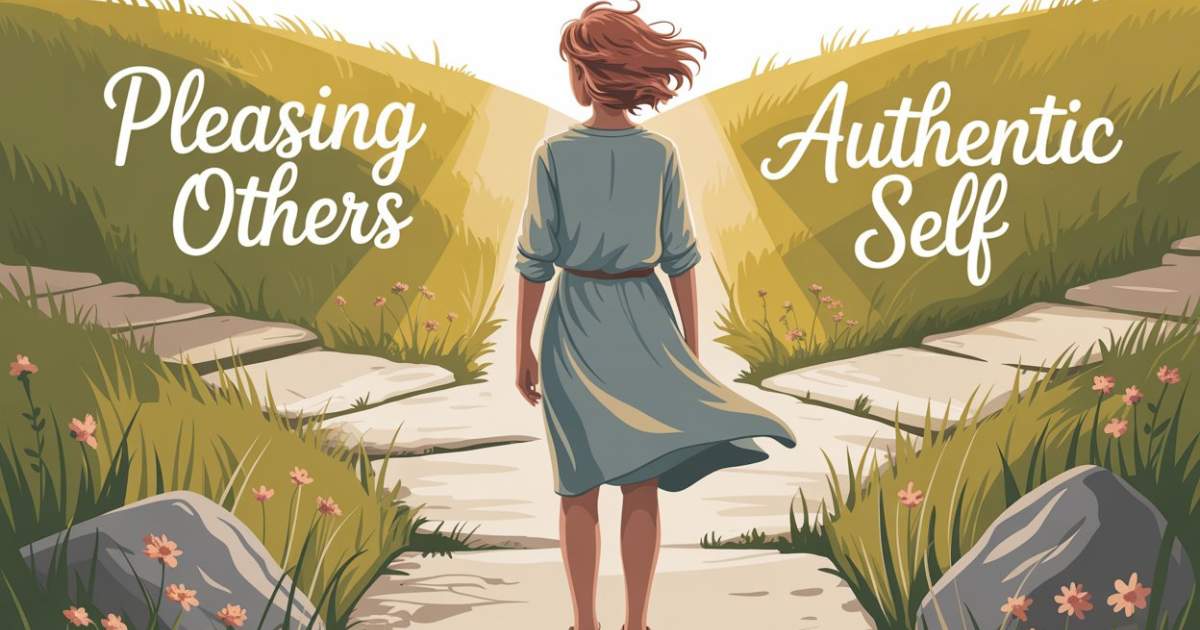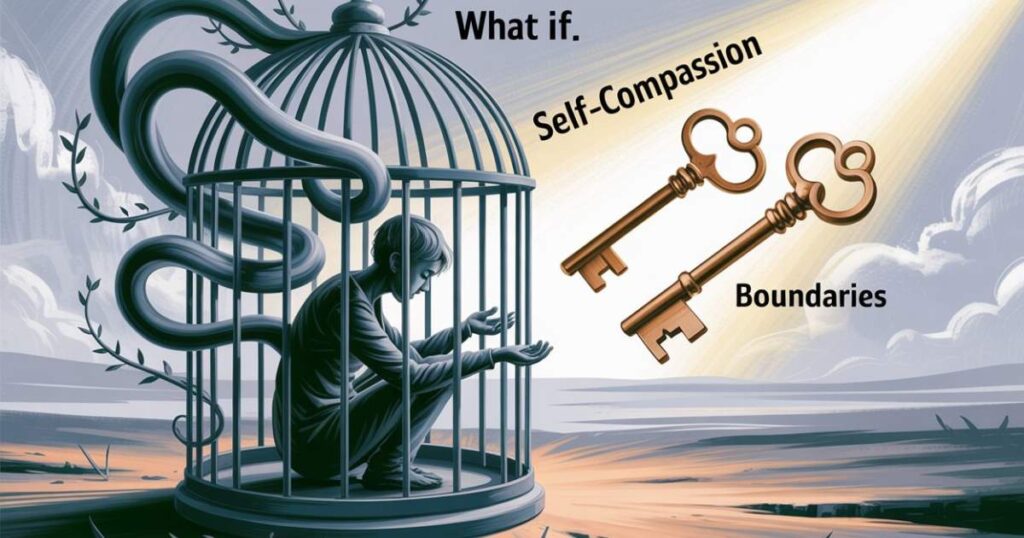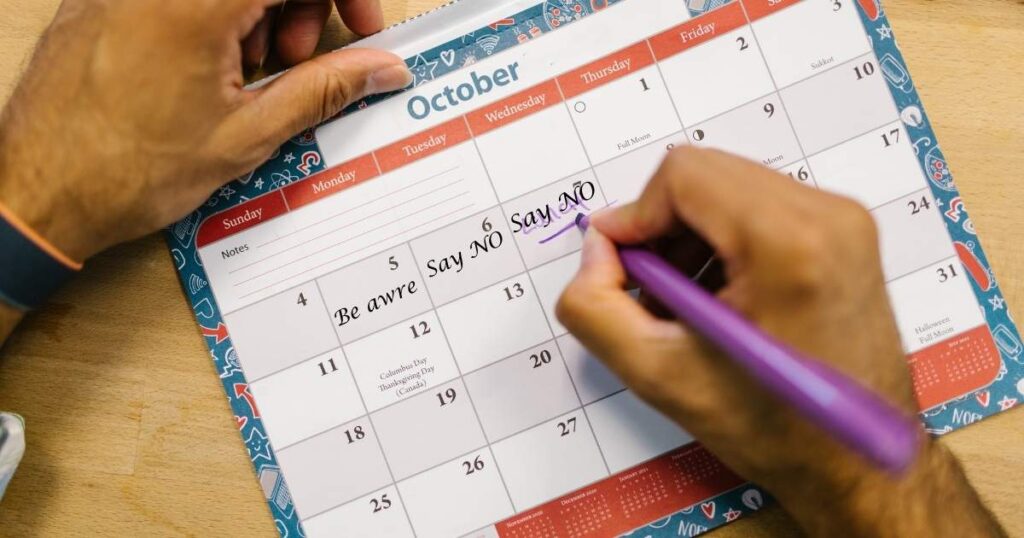
Olga Rudin
Mind Coach & BWRT Therapist

How to Stop Being a People Pleaser Without the Guilt
Do you frequently say yes to requests, even when your workload is already excessive? If you’re nodding along, you might be a people-pleaser. It isn’t just about being kind; it’s a cycle that can make you feel exhausted and confused.
Many of us have learnt to prioritise the happiness of others, even at our expense. We fear saying no because we want to be liked. But here’s the truth: you can break free from this cycle without becoming selfish or hurting the people around you.
Let’s explore how to stop being a people-pleaser whilst keeping your kind heart intact.
What Is a People Pleaser?
A people-pleaser is someone who prioritises others’ needs over their own. It’s more than just being helpful – it’s a deep need to please that drives almost every choice you make.
The Hidden Signs of People-Pleasing Behaviour
People-pleasers seem nice at first, but being around them can get tiring. You might not even know you’re doing it. Here are the signs:
-
- You say sorry all the time – Do you apologise constantly, even when nothing is your fault? You say sorry for existing, for having needs, or for taking up space.
-
- You can’t make simple choices alone – You struggle to decide what movie to watch, where to eat lunch, or which shirt to wear without asking others first. Everything needs someone else’s approval.
-
- You’re afraid of letting people down – The thought of disappointing someone feels terrible. So, you say yes to things you don’t have time for or don’t want to do.
-
- You do things that aren’t your job – You end up doing tasks at work or home that aren’t your responsibility. You do this because you don’t want to deal with arguments or have people dislike you.
Why We Become People-Pleasers
Most people-pleasers aren’t born this way. This personality trait usually develops early in life. Perhaps you learnt that love came with conditions – you had to be “good” to receive approval from others.
You may have grown up in a family where keeping peace was more important than expressing your true feelings. Or perhaps you learnt that your worth was tied to how much you could help others.
Fear of rejection plays a huge role. When a person fears rejection or failure, they often try to make people happy at the expense of their own needs. It feels safer to be nice to everyone than to risk someone not liking you.
But here’s what many don’t know: just because people think you’re nice doesn’t mean they truly respect or love you.
The Real Cost of People-Pleasing

While trying to keep others happy might seem harmless, it can have serious negative consequences for your mental health and relationships.
What People-Pleasing Does to Your Mental Health
You might not even realise that your need to please others can impact your mental health.
People-pleasers often pay close attention to the moods and reactions of others. It makes you highly attuned to others, but it’s exhausting work.
Psychology shows us that this constant vigilance can lead to stress and anxiety. Your nervous system stays on high alert, always ready to jump into action to please someone.
Over time, this can result in burnout. You become emotionally depleted from giving so much of yourself away. The irony is that going too far to please others often leaves you feeling resentful rather than fulfilled.
You might also experience perfectionism, another common trait among people-pleasers. Nothing feels good enough because you’re always worried about disappointing someone.
People-pleasing may seem helpful for relationships, but it often does more harm than good. When you constantly try to please others, you’re not showing them the real you.
How People-Pleaser Habits Damage Relationships
This creates fake friendships based on what others want to hear. People can sense when someone isn’t being genuine, even if they can’t quite put their finger on it.
Your behaviour also teaches others that it’s okay to take advantage of your kindness. They learn that you’ll do anything they ask, so they stop considering your needs.
Meanwhile, you’re building up resentment inside. You feel angry that others don’t consider your needs, but you’ve never actually expressed what those needs are.
Why Trying to Control Other People Backfires
Here’s something that might surprise you: people-pleasing is a form of control. When you’re constantly trying to control other people’s emotions and reactions, you’re attempting to control how others see you.
But this backfires. The more you worry about others’ opinions of you, the more anxious you become. You can’t control what people think, no matter how perfectly you behave.
It’s hard to accept, but doing so can bring you a sense of freedom. Once you recognise that you can’t control others’ reactions, you can start focusing on what you can control – your own behaviour and choices.
Why Guilt Keeps You Stuck as a People-Pleaser

Guilt is the biggest obstacle to change. It creates a vicious cycle that keeps you trapped in old habits.
The cycle works like this: you please others until you feel drained, then you feel guilty for feeling tired, so you push yourself harder to make up for it. It goes round.
You might worry that setting healthy boundaries makes you selfish. This fear runs deep for many people-pleasers. The idea of disappointing someone feels almost unbearable.
You may have concerns that by starting to say no, others will perceive you as unkind or difficult to work with. A woman who is people-pleasing may not want people to see her as someone demanding or high-maintenance.
But here’s the truth: feeling guilty about having needs is like feeling guilty about being human. Everyone has limits, and respecting yours doesn’t make you a bad person.
The Guilt-Free Way to Stop Being a People-Pleaser
Breaking away from this behaviour doesn’t mean you have to stop being caring or kind. You can be kind and still set boundaries with others.
Take Small Steps with Low-Stakes Situations
Don’t try to change everything at once. Begin with small situations where the stakes are low. If a colleague asks you to cover their shift but you already have plans, try saying no politely.
Choose your battles wisely. Start with people who are generally understanding and supportive. Save the more challenging relationships for when you’ve built up more confidence.
Practice makes perfect. Each time you set boundaries, it becomes a bit easier. Your self-esteem grows as you realise that the world doesn’t end when you prioritise your needs.
Reframe Your Thinking about People-Pleasing
One powerful shift is recognising that saying no can be a gift to others. When you’re honest about your limits, you model healthy behaviour for the people around you.
Healthy boundaries improve relationships rather than harm them. People respect others who respect themselves. It might feel scary at first, but most people appreciate honesty.
Remember the old saying: you can’t pour from an empty cup. Taking care of your own needs first helps you have more real energy to help others.
Scripts for Common People-Pleaser Situations
Having specific phrases ready can help when you need to set boundaries. Here are some gentle but firm responses:
When someone asks for a favour, say, “I’d love to help, but I’m not available for that right now.”
When you disagree with someone: “I see it a bit differently. What if we tried this approach instead?”
Instead of apologising constantly, replace “Sorry I’m late” with “Thanks for waiting” or “Sorry for bothering you” with “Thanks for your help.”
Changing how you talk a little can improve how you feel about yourself and how others see you.
Building Your New Identity Beyond People-Pleasing Behaviour

Changing this pattern isn’t just about saying “no” more often. It’s about discovering who you are when you’re not trying to please everyone else.
Discovering What You Actually Want
This might sound simple, but many people-pleasers have spent so long focusing on others that they’ve lost touch with their preferences. What do you enjoy? What matters to you?
Start small. Pay attention to your body’s signals. Do you like that restaurant, or did you just agree because others picked it? What music makes you feel good when you’re alone?
Trust your instincts. That gut feeling you get about situations is valuable information. People-pleasers often overlook their feelings, but it’s important to pay attention to them.
Practise self-compassion during this transition. It takes time to reconnect with yourself. Be patient with the process of overcoming your people-pleasing tendencies; change takes time.
Creating Boundaries That Work
There’s a difference between being kind and being a doormat. Kind people care about others while still respecting their needs. Doormats let others walk all over them.
You can still please others in healthy ways. The key is choosing when and how to help rather than automatically saying yes to everything.
Create boundaries that protect your energy. This might mean limiting how much time you spend listening to a friend’s problems or saying no to extra work when you’re already overwhelmed.
Remember, boundaries aren’t walls – they’re gates. You can choose when to open them and when to keep them closed.
Dealing With Pushback from Others
Not everyone will like your new boundaries, and that’s okay. Some people expect you to do whatever they want. They might not like it if you start to stand up for yourself.
They might try guilt traps or manipulation to get you back to your old patterns. This shows that your boundaries are working and that you needed them.
Stay firm without feeling guilty. Remind yourself that their discomfort with your boundaries is not your problem to solve. You’re not responsible for managing other people’s emotions.
If someone stops being your friend because you won’t do everything they ask, were they really a friend in the first place?
Your 30-Day Plan to Stop Being a People-Pleaser

Change takes time, but you can start seeing results within a month if you’re consistent with small daily actions.
Week 1: Focus on awareness. Notice when you say yes when you mean no. Pay attention to that feeling of resentment when you’ve overcommitted yourself. Just watch your habits for now but wait to make changes later.
Week 2: Begin saying no to small requests. Once a day, turn down a small request. Get comfortable saying, “That doesn’t work for me” or “I’m not available.”
Week 3: Start expressing your opinions in low-risk situations. Share your preference for where to eat lunch or what film to watch. Notice that most people don’t mind when you have preferences.
Week 4: Set one bigger boundary and celebrate your progress. This might mean telling a friend you can’t chat for hours every evening or saying no to an extra project at work.
Remember, progress isn’t always linear. Some days will be harder than others, and that’s completely normal.
Final Thoughts
Taking care of your needs helps both you and the people around you. When you stop trying to be everything to everyone, you become more authentic in all your relationships.
This journey takes time and practice. As you learn to set boundaries, the guilt will lessen, and you can still be a caring person.
You don’t have to choose between being kind and having your needs. In healthy relationships, both help each other.
If you need extra help, a mental health professional can provide tools and support as you navigate this important change.
Take the first step today. Your future self will thank you for it.